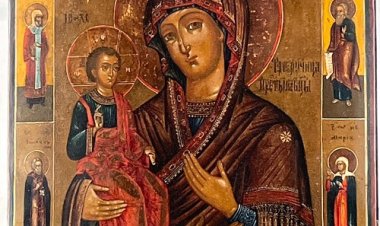Alternative creative ways to pray the Rosary
A suggestion of praying SEVEN sets of mysteries - one for each day of the week.

Alternative creative ways to pray the Rosary
Traditionally each set of mysteries is usually prayed on different days during the week, as follows:
Monday and Saturday, the Joyful mysteries: that is,
- the Annunciation 2. the Visitation 3. the Nativity 4. the Presentation
- the Finding of Jesus in the Temple.
Tuesday and Friday, the Sorrowful mysteries: that is,
- the Agony of Jesus at Gethsemane 2. the Scourging 3. the Crowning with thorns
- the carrying of the Cross 5. the Crucifixion and Death of Jesus.
Wednesday and Sunday, the glorious mysteries:
- the Resurrection 2. the Ascension 3. Pentecost 4. the Assumption of Mary
- the Coronation of the Virgin Mary.
Thursday, the luminous mysteries:
- the Baptism of Jesus 2. the Wedding at Cana 3. the Proclamation of the Kingdom of God
- the Transfiguration of Jesus 5. the Institution of the Holy Eucharist.
I believe there is need to develop further options. I would suggest 7 sets of mysteries, one for each day of the week. And just as I was praying about it and looking for further inspiration, I came across a little book by Fr Jules Mimeault CSsR, a Canadian Redemptorist priest who already arranged 35 mysteries of the Rosary to be prayed in 7 days! This is how he designed these.
ALTERNATVE A:
Sunday – Glorious mysteries I – Encounter with the Risen Lord.
- The empty tomb and Mary of Magdalene – Lk24:1-8
- The meeting with the disciples of Emmaus – Lk24:30-33
- Encounter with the disciples in Jerusalem – Lk24:36-40
- The encounter with Thomas – Jn20:27-29
- Encounter with Peter – Jn21:17
Monday – Glorious mysteries II – The mission of the church
- Commissioning of the Apostles – Mt:16-20
- Ascension – Acts1:6-9
- Pentecost – Acts2:1-4
- Assumption – Lk1:46-49
- Crowning of our Lady as Queen of Heaven – Rev12:1.5
Tuesday – Joyous mysteries
- Annunciation – Lk1:28-33
- Visitation – Lk1:41-45
- Nativity – Lk2:10-12
- Presentation of Jesus in the Temple – Lk:22.39-40
- Finding Jesus in the Temple – Lk2:46-49.51-52
Wednesday - Luminous Mysteries part I
- Baptism of Jesus – Mk1:9-11
- Temptation of Jesus – Lk4:1-2.12-13
- Preaching of the Kingdom – Mk1:14-17
- Wedding at Cana - Jn2:1-5.11
- Encounter with the Samaritan at the well – Jn4:4.9-10.23-24
Thursday - Luminous Mysteries part II
- Peter’s profession of Faith – Mt16:15-16.21
- Transfiguration – Mt17:5-8
- Healing of the blind-from-birth man – Jn9:1.5-7
- Resuscitation of Lazarus – Jn11:21-27
- Last Supper (Institution of the Eucharist/Washing of feet) – Lk22:14-15.19-20 or Jn17
Friday - Sorrowful Mysteries
- Agony in the Garden – Mk14:32-36
- Scourging at the Pillar – Mk15:15
- Crowning of Thorns – Jn19:1-5
- Carrying of the Cross – Lk23:26-27.32
- Crucifixion and death on the cross – Mk15:25.34-37
Saturday - Synthesis of Mary’s life
- The Annunciation – Lk11:35-37
- Nativity – Lk2:6-7
- Presentation – Lk2:34-35
- Finding in the temple – Lk2:48
- Wedding at Cana – Jn2:2-5
Alternative B
And as I was typing up this document, I came across another interesting alternative by Larry London published by “Our Sunday Visitor” – The Seven-Day Scriptural Rosary – also with 35 mysteries, blending the three traditional sets with four new sets:
Monday – The Joyful mysteries
Tuesday – The Salvation mysteries
Wednesday – The Healing mysteries
Thursday – The Eucharistic mysteries
Friday – The Sorrowful mysteries
Saturday – The Consoling mysteries
Sunday – The glorious mysteries
I wonder whether these ideas would ever catch on?
Are they too complicated to memorize them all?
It means only 15 extra, and in a sequence which is not difficult to remember.
I definitely like these alternatives.
Of course, I consider the traditional 15 plus 5 mysteries (added by Pope John Paul II twenty years ago and rapidly integrated) perfectly valid and appropriate, but would suggest alternatives for some of the days to avoid the current repetition of 4 sets over 7 days.
My further suggestion would be to organize the mysteries as follows, for each day of a week, so that there is a progression through the week from the Annunciation to Pentecost, in a chronological and easy to remember order through the New Testament. It retains the 4 current sets of mysteries but adds 3 new sets of special elements in the life and ministry of Jesus:
ALTERNATIVE C:
Monday – Joyful mysteries
the Annunciation, the Visitation, the Nativity, the Presentation, the Finding of Jesus in the Temple
Tuesday – Miraculous mysteries – 5 top miracles of Jesus
The healing of the paralytic – Mk 2:1-12
The feeding of the 5000 – Jn 6:1-15
The raising of the son of the widow at Nain – Lk7:11-17
The calming of the storm – Mt8:23-27
The healing of the woman with the hemorrhage – Lk8:43-48
Wednesday – Prophetic/Evangelizing mysteries – 5 parables
The Good Samaritan – Lk 10:30-37
The Sower, the seed and the four types of soil – Mt 13:3-8,18-23
The Prodigal son – Lk 15:11-32
The Unmerciful servant - Mt 18:23-34
The parable of the talents Mt 25:14-30 or The Sheep and goats (what you did to me) - Mt 25:31-46
Thursday – Luminous mysteries
the Baptism of Jesus, the Wedding at Cana, the Proclamation of the Kingdom of God,
the Transfiguration of Jesus, the Institution of the Holy Eucharist.
Friday – Sorrowful mysteries
the Agony of Jesus at Gethsemane, the Scourging, the Crowning with thorns, the carrying of the Cross, the Crucifixion and Death of Jesus
Saturday – Ecclesial mysteries or Mysteries of Reconciliation, or the mysteries of the “I am” statements of Jesus? – still need to finalize the options!
For the present – ad lib.
Sunday – Glorious mysteries
the Resurrection, the Ascension, Pentecost, the Assumption of Mary, the Coronation of the Virgin Mary
To conclude:
There must be hundreds of further creative and meaningful alternatives to praying the Mysteries of the Rosary meditatively to avoid the risk of falling into a routine and the mechanical reciting of this great Christological and Marian devotion. To be faithful to tradition does not mean being slaves of it. Let us avoid the danger of just ‘babbling prayers’ the Jesus warned us about, and promote our pious meditation on the life of Christ through creative alternatives to our daily Rosary.
(Fr Francois Dufour sdb - 2020)


















